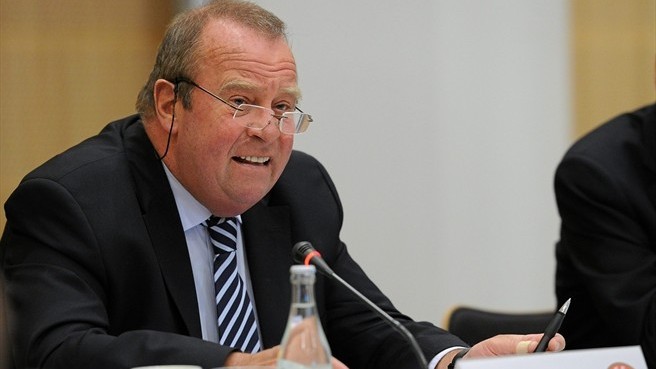By Andrew Warshaw
May 13 – FIFA’s medical chief has called on football leagues across the world to pay more attention to the dangers of sudden heart failure following the tragic deaths of two young Belgian players in the space of two weeks.
Michel d’Hooghe (pictured) says that while FIFA and UEFA have taken effective measures in their own competitions to tackle the threat of cardiac arrest, more can be done on a global level to try and save lives.
Two weeks after 24-year-old Lokeren central defender Gregory Mertens died in hospital after collapsing as he played in a reserve game, lower-league fullback Tim Nicot, 23, of fourth-tier Wilrijk-Beerschot, suffered a similar fate.
Although cardiac arrest is rare, d’Hooghe says the numbers are growing, not receding, and that there is no room for complacency.
“It may be a coincidence that these two cases have happened in Belgium but in the world of sport, and football in particular, there are more and more cases of sudden cardiac arrest,” d’Hooghe told Insideworldfootball.
“There was direct intervention in both these cases but in general more can be done in terms of both prevention and therapy. We must intensify screening before games, and then treatment, when something happens. I have no authority when it comes to competitions outside FIFA and UEFA and there is never a guarantee in medicine. But the fact is that with serious screening we can avoid 75 percent of the problem.”
Stepping up his call for more defibrillators to be used across football, d’Hooghe rejects the argument is that they are too expensive in some countries. “I will never accept this. What is the price of a human life? Defibrillators cost a lot less than one single player transfer.”
Radical though it may sound, the veteran Belgian doctor, head of FIFA’s medical committee and one of the organisation’s longest serving executive committee members, would like to make it obligatory that at least one player in every team is sufficiently trained in heart massage in case there is no doctor present.
“Ideally I’d like to see one player per team – and I’m not talking only about the professional game – take a course so that he can intervene in cases of sudden cardiac arrest,” said d’Hooghe. “The first minutes are the most important, otherwise you can risk losing the player. Young people have vaccinations against disease. This is just as important.”
Three years ago Bolton midfielder Fabrice Muamba, then 23, suffered a cardiac arrest in an FA Cup game at Tottenham Hotspur. His heart actually stopped for 78 minutes and although he miraculously recovered he has never played again. ”Cardiac arrests in football are always dramatic because they invariably involve young people who should be a symbol of good health,” said d’Hooghe. “With good education and the presence of emergency equipment, we can seriously reduce the problem and save lives.”
Contact the writer of this story at moc.l1745015514labto1745015514ofdlr1745015514owedi1745015514sni@w1745015514ahsra1745015514w.wer1745015514dna1745015514

